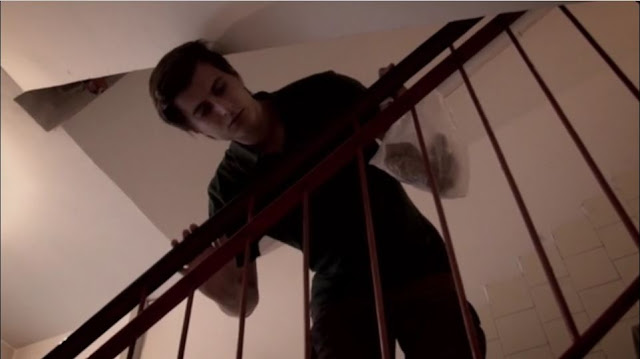 |
| Jakub |
Temporary Visa tells the story of Jakub, a British man living in Bosnia Herzegovina, attempting to get 500 marks (local currency) to prevent himself from getting deported back to England. He lives with his girlfriend, Emira, and is best friends with Zlaja, a thief by profession.
Deportation, as a theme, has become increasingly common. Throughout the world, there are many cases where people are being deported for unfair reasons, stories which often make the news and are sometimes stranger than fiction.
However, Temporary Visa presents the story from a less deportation focused angle. The movie feels more like a commentary on what extents people go to to earn money and the blurring of lines between good and bad.
Jakub, for the first half of the movie, spends most of his time attempting to look for money to pay for the documents required to prevent his deportation. He doesn’t have a job, go to school, or work for an NGO, so getting the paperwork and money together is a difficult task. He wants to stay with his girlfriend Emira. His friend Zlaja attempts to help him by teaching him how to steal and sell stolen goods. The moral quality of theft and search for money is a large theme explored in the movie.
 |
| Emira, Jakub's girlfriend |
Emira is Jakub’s reason for wanting to stay in Bosnia Herzegovina. It is obvious from the beginning that she is also the driving force between them. She is the one with the job, the one who speaks with other characters on Jakub’s behalf, the one who eventually gets him a job at the hostel. She herself works at a clothing store, and we spend a lot of time watching her go through the clothes for extremely long takes.
 |
| Zlaja, Jakub's friend and a thief |
For a thief, it is strangely easy to sympathize with Zlaja. While the way he earns money is definitely morally incorrect to many, Temporary Visa depicts many other characters as having criminal habits. Zlaja, for the most part, is characterized as a good friend. He immediately gives the money he has made to Jakub when his friend says he needs 500 marks. To him, the end justifies the means.
For a movie that is 2 hours long, most of the time comes from the shots where the characters are walking from place to place and cleaning the store where Emira works. Most mainstream movies tend to skip over these scenes, but in Temporary Visa, Alqudcy chooses to keep these moments inside. The number of scenes where we see Jakub walk up and down stairs is impossible to keep track of.
The only cuts in the movie are between scenes. Within scenes, we follow the character as they move around the space (apartment, store and the streets of Sarajevo), using a handheld camera. This makes the movement of the camera feel organic and part of the action, but calls attention to the fact that this is a movie. You feel ingrained within the frames, but are constantly aware of the fact that this is fictional. It feels, not necessarily in a bad sense, very low budget. There are no special lights, everything is natural. No wide shots to establish location. No music.
Nothing you couldn’t do with a camera phone.
Nevertheless, that is not to say that the movie is amateurish. Even though it gives the feeling of being filmed on the whim, to assume that there was no rehearsal time or intentional blocking would be wrong. The camera follows the actors so seamlessly without any fuss, constantly framing them in interesting and innovative ways.
It is difficult to place Temporary Visa on any spectrum. The movie explores the themes of deportation and money effectively, if a bit slowly. It’s pace makes the audience wait for the action, and the highest moments of tension really pay off. But at what cost?
Review by Valerie Tan
Temporary Visa was screened yesterday as part of the Singapore International Festival of the Arts Singular Screens programme and will be screened again on 25 May, at the Asian Film Archive's Oldham Theatre Screening Room.

